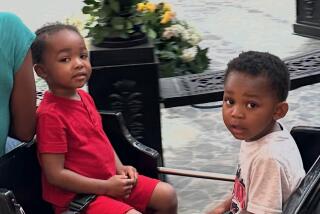A Tough Season for Ballplayers
Palmdale Pony League coach Derek Rushing is used to wearing a lot of different hats -- mentor, confidant, cheerleader.
But this season was different. Rushing was thrust into the role of grief counselor for his young Angel team after a tragedy involving two boys, including one of his players.
On April 12, as dozens of horrified spectators looked on, a 13-year-old Angel player in the snack bar line allegedly grabbed an aluminum bat from his equipment bag and clubbed a 15-year-old boy in the head during an argument. Jeremy Rourke, a ninth-grader at Highland Park High School and a former Pony League all-star, died a short time later.
To help his players cope, Rushing enlisted the assistance of Bill Vail, a Lancaster-based crisis counselor.
Vail facilitated two sessions within days of the killing to help the Palmdale Pony League players and their families try to make sense of the slaying.
He began the sessions by encouraging people to talk about what happened. “The best way to process it is to talk about it as much as you can,” he said.
Remarkably, there was no anger among the players or their families, he said.
Instead, there was collective sorrow for Rourke and for the young suspect, whose name is being withheld because of his age.
“I was so impressed. People were not there to take sides,” Vail said. “They were there to hurt for both families.”
Terri Chambers, whose 14-year-old son plays shortstop for the Angels, said neither family was to blame.
“You can’t take sides when neither one of these families willed this to happen,” she said.
Indeed, the tightly knit Pony League community rallied behind both families. They set up dual accounts at Antelope Valley Bank where people could contribute to help cover funeral expenses. They also arranged for dinners to be delivered to both families in the weeks after the killing.
“There are lifelong friendships that are built here,” said league President Ken Curtis. “That is something that we are proud of.”
About 350 children play in the 31-team league, which is divided into divisions by age group. Children generally start playing at 5 and stay until they’re 14.
League and team officials agreed to postpone any future games until after Jeremy’s funeral, Curtis said.
Both boys were well known in the baseball community, and their families were friends.
Jeremy, a well-liked boy, grew up playing in the league.
The 13-year-old suspect -- a longtime Pony Leaguer as well -- comes from a well-regarded family and is not considered a troublemaker. The boy has been in custody since the attack and is being charged with murder. He is scheduled to appear in juvenile court in Lancaster on July 6.
Under California law, the suspect cannot be tried as an adult because of his age. If he is found responsible, he can be committed to the California Youth Authority until he turns 25.
In addition to recruiting Vail’s help, Rushing turned to school counselors in the aftermath, supplying them with the names of Pony League players and asking that they reach out to each one.
“I don’t know how I would deal with it as a kid,” Rushing said, adding that his approach as coach has been to let his players talk about the incident at their own pace and shield them from the media.
“For me, it’s been trying to keep the kids focused and keep them away from people that want to relive it,” he said.
Normally, the Pony League season would have wrapped up weeks ago, with new championships declared and trophies distributed. But a revised schedule pushed back the season, which ended last Saturday.
Although some thought that play should not have resumed, Rushing said the players felt differently.
“They were itching to get back,” he said. “They were desperate to get back.... Once they get out here, all their troubles go away.”
League officials also turned to Vail, school counselors and local pastors for their help in deciding how to proceed.
“We asked how soon should we get back to the game,” said league president Curtis. “Two days? Two weeks? Two months? When is too soon?” The response was unanimous: “As quickly as possible.”
“You’ll never be the same, but you just have to go back to a place as close to normal as possible and that’s getting back to a routine and going through the stages of healing -- the anger, the sorrow and the whole thought process of healing,” Curtis said as he watched his son’s game a couple of weeks ago. “We were all hurt by it.”
Everyone’s method of coping has been different.
The Chambers household turned to spirituality.
“You just have to pray and let God see you through all of this, and that’s how we chose to deal with this,” said Chambers, the mother of one of the 13-year-old suspect’s teammates.
She said the players don’t want to dwell on the death and that it has been good for her son to get back to the game.
Little by little, references to the fateful night are fading from everyday conversation.
“It’s not forgotten, but it’s not brought up anymore,” said Noel Briggs, 56, who umpired the game between the Angels and the Dodgers on the night of the killing. “I just don’t think it’s an issue that should be talked about constantly. What happened is a tragic loss.... There’s nothing that anybody can say that can really ease the pain.”
More to Read
Go beyond the scoreboard
Get the latest on L.A.'s teams in the daily Sports Report newsletter.
You may occasionally receive promotional content from the Los Angeles Times.





